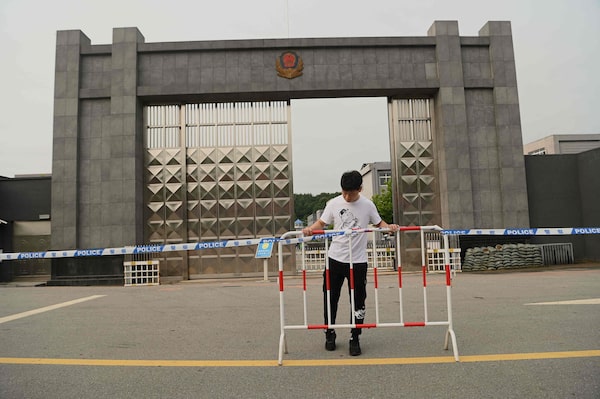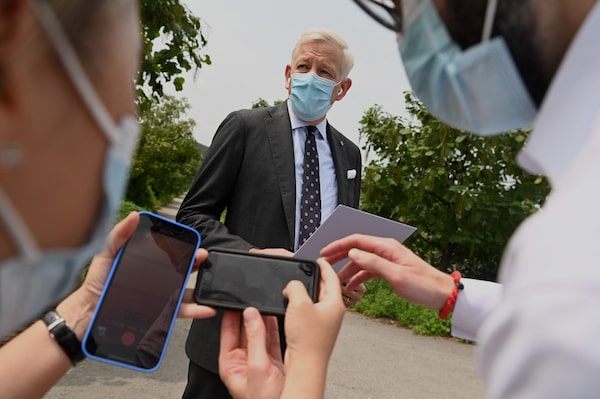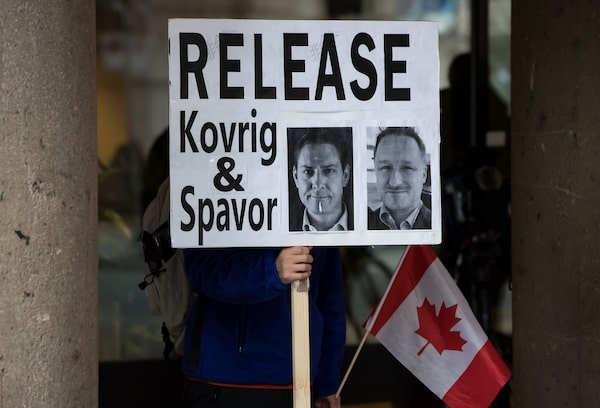
A man puts police tape in front of the Dandong city detention centre, where Canadian businessman Michael Spavor is being held on spying charges, in China's northeast Liaoning province, on Aug. 11.NOEL CELIS/AFP/Getty Images
Canadian businessman Michael Spavor has been found guilty of espionage by a Chinese court and sentenced to 11 years in prison.
A court in the northern Chinese city of Dandong said Mr. Spavor had been found guilty of spying and illegally providing state secrets to foreign entities. Mr. Spavor will have up to two weeks to file an appeal against this verdict, Canadian officials said.
Speaking via video link from Dandong after meeting with Mr. Spavor, Canada’s ambassador to China, Dominic Barton, said “we condemn in the strongest possible terms” the verdict and sentence, which were “rendered without due process or transparency.”
Canada held secret U.S. talks in bid to free Kovrig, Spavor jailed in China
He added that “we are obviously very disappointed” with the sentence. Mr. Barton transmitted a brief message from Mr. Spavor to supporters around the world: “One: Thank you for all your support ... two: I am in good spirits, and three: I want to get home.”
The court statement said Mr. Spavor will be deported, but it was not immediately clear when this would take place.
Mr. Barton said this would most likely occur following the completion of a prison term, but said that the possibility of getting Mr. Spavor out earlier will be a key focus for Canadian officials.
The decision was handed down Wednesday, one day after a different Chinese court rejected an appeal by Robert Schellenberg, a Canadian who faces a death sentence for drug trafficking.

Canadian Ambassador Dominic Barton gives a statement near the Dandong city detention centre, on Aug. 11.NOEL CELIS/AFP/Getty Images
Mr. Spavor, who lived and worked in China, and Michael Kovrig, a former Canadian diplomat, were seized by Chinese authorities on Dec. 10, 2018, shortly after Ms. Meng’s arrest. Weeks later, Mr. Schellenberg’s case was abruptly retried and his punishment escalated from 15 years in prison to a death sentence.
Speaking to reporters after the Schellenberg verdict on Tuesday, Mr. Barton suggested the timing of these decisions had been calculated. “I don’t think it’s a coincidence that these are happening right now while events are going on in Vancouver,” he said, referencing the court hearings for Huawei executive Meng Wanzhou, who was arrested in Canada on a U.S. extradition request.
Guy Saint-Jacques, a former Canadian ambassador to China, said the men are victims of China’s “hostage diplomacy,” something it has used for decades. China has made it a common practice to engage in tit-for-tat arrests and charges – as well as trade sanctions – as part of a pattern of coercive foreign relations, he said.
China has demanded Ms. Meng be released unconditionally, saying her detention is part of a Western plot to suppress China’s high-tech companies. U.S. authorities accuse Ms. Meng and other Huawei executives of lying to banks so that they would clear transactions with Iran through the United States, despite U.S. sanctions.
The timing of the Schellenberg and Spavor verdicts is strategic, Mr. Saint-Jacques said. Not only is Ms. Meng’s extradition case now entering its final stages in a B.C. court, but Canada is expected to be plunged into a federal election campaign in the coming weeks.
“It’s all part of their strategy to put pressure on Canada to release Ms. Meng,” Mr. Saint-Jacques said. “They just want to send the message that we will pay a price if we don’t agree to return her.”
Send a message to Michael Spavor and Michael Kovrig as they near 1,000 days in detention in China
There has been no word from China on the fate of Mr. Kovrig – who, like Mr. Spavor, will have been locked up by China for 1,000 days as of Sept. 4 this year.

A young man holds a sign bearing photographs of Michael Kovrig and Michael Spavor outside B.C. Supreme Court, in Vancouver, on Jan. 21, 2020.DARRYL DYCK/The Canadian Press
Chinese authorities have accused both Mr. Spavor and Mr. Kovrig of violating state secrets laws, but have made public no evidence of their alleged wrongdoing. Neither man has been granted bail.
Mr. Barton said that little evidence was introduced at trial, but that Chinese prosecutors indicated the case against Mr. Spavor was based mainly on photographs taken at airports, which he maintained were benign. Chinese authorities claimed they showed sensitive areas or aircraft.
Mr. Spavor is imprisoned in Dandong, a city where he had been living that is located on the border with North Korea. He has, in correspondence with family, requested sleeping masks, which suggests he is being kept in a facility with 24-hour lighting.
He underwent a secret, two-hour trial in March this year in Beijing. The court declined to issue a verdict or sentencing at the time. Canadian diplomats had asserted their consular rights to attend the trial, but China barred them from the proceedings.
Conservative Leader Erin O’Toole, speaking to reporters on Tuesday about the rejection of Mr. Schellenberg’s appeal, accused China of condemning Mr. Schellenberg to death in retaliation for Ottawa’s arrest of Ms. Meng.
“The denial of Robert Schellenberg’s appeals must be seen for what it is – a foreign government planning to take the life of a Canadian for political reasons. The use of the death penalty is abhorrent, but to impose it for political reasons is inexcusable,” Mr. O’Toole said.
After Canada arrested Ms. Meng, Chinese authorities ordered Mr. Schellenberg, who had already been handed his initial 15-year drug sentence, to face retrial. Prosecutors, citing the emergence of new evidence, alleged that he was involved in organized international drug trafficking, a crime whose maximum sentence is execution.
Mr. Schellenberg, in his late 30s, was tried again and, in January, 2019, found guilty of conspiring to traffic 222 kilograms of methamphetamine. He was sentenced to be executed. Prime Minster Justin Trudeau’s government has called his retrial and the sentence “arbitrary.”
Mr. Saint-Jacques said the only hope for Mr. Schellenberg now is if his case becomes part of a “grand bargain” swap deal, where the U.S. would drop its extradition request for Ms. Meng in exchange for prisoners, including Mr. Spavor and Mr. Kovrig, being sent home.
Ms. Meng, who is out on bail and living in a $13.7-million Vancouver home, can fight her extradition order with appeals that could play out for years.
Mr. Barton travelled to Washington in April to enlist U.S. assistance in freeing Mr. Spavor and Mr. Kovrig. But Mr. Saint-Jacques said the U.S. does not appear “to be a in a mood to compromise” with China.
The abrupt revision to Mr. Schellenberg’s sentence in early 2019 and the seizures of Mr. Spavor and Mr. Kovrig in late 2018 have drawn protests from Canada. Robert Oliphant, a parliamentary secretary to the Minister of Foreign Affairs, has called the arrests of Mr. Kovrig and Mr. Spavor “targeted abductions.”
China’s conduct has drawn criticism from many Western countries. On Tuesday, Mr. O’Toole reminded China that all eyes will be on the Spavor verdict. “The Chinese Communist Party needs to know that the world is watching,” he said.
Mr. O’Toole said he’s not sure that Canadian athletes will be safe if they travel to China in early 2022 for the Winter Olympic Games, which are taking place in Beijing.
“Canadians just enjoyed celebrating the amazing achievements of our athletes in Tokyo. I know how hard our athletes are training for Beijing, but we are approaching a point where it won’t be safe for Canadians – including Olympic athletes – to travel to China. The outcomes of the Spavor and Kovrig cases will help us answer that question,” Mr. O’Toole said.
Foreign Affairs Minister Marc Garneau on Tuesday denounced the Chinese decision against Mr. Schellenberg, saying the death sentence was “arbitrary” and “cruel and inhumane punishment.”
The Chinese embassy in Canada, in an unsigned statement posted on its website Tuesday, said it strongly condemned Mr. Garneau’s comments, suggesting the Canadian government had no grounds to make “irresponsible remarks” on Chinese court decisions.
“China will never allow drug dealers from any country to harm or poison the Chinese people. The law is not a trifle,” the embassy said. “China requires Canada to earnestly respect China’s judicial sovereignty, be cautious in words and deeds, and stop making any irresponsible remarks to avoid self-humiliation.”
Prime Minister Justin Trudeau said a Chinese court's sentencing of Canadian businessman Michael Spavor to 11 years in prison for espionage on Wednesday was 'absolutely unacceptable' and called for his immediate release. Flora Bradley-Watson reports.
Reuters
Our Morning Update and Evening Update newsletters are written by Globe editors, giving you a concise summary of the day’s most important headlines. Sign up today.
 James Griffiths
James Griffiths Steven Chase
Steven Chase